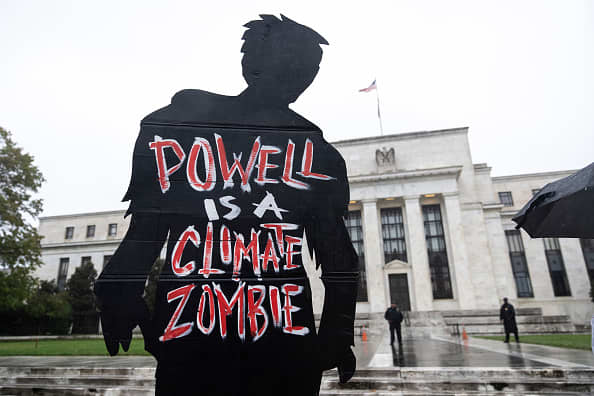
Climate activists rally against Federal Reserve Chair Jerome Powell outside of the Federal Reserve Board Building October 29, 2021 in Washington, DC.
Drew Angerer | Getty Images
In 2007, our global financial system was pushed to the brink of collapse after financial regulators ignored reckless lending.
In the aftermath of that financial crisis, regulators vowed to prevent a similar crisis in the future.
But now, those same regulators are once again ignoring a devastating risk to our economy, our health, and our safety: the climate crisis.
Last month, President Joe Biden and leaders from more than 190 countries gathered in Glasgow for the 26th Conference of Parties to the United Nations Framework Convention on Climate Change, a summit to strengthen climate action commitments under the Paris climate agreement.
In Glasgow, Biden reiterated the U.S.’s commitment to cut emissions that cause dangerous short-term warming and end new international financing of unabated fossil fuel energy.
U.S. President Joe Biden speaks during the “Accelerating Clean Technology Innovation and Deployment” event at the UN Climate Change Conference (COP26) in Glasgow, Scotland, Britain November 2, 2021.
Evan Vucci | Pool | Reuters
Banks controlling $130 trillion in assets pledged to align their investing activities to achieve net-zero emissions by 2050. These commitments move us toward the bold action we need to protect public health and safeguard our future, but pledges and promises only go so far. We need action and accountability.
And we need leadership that will get it done. We were disappointed in the Biden administration’s decision to nominate Jerome Powell to continue serving as Chairman of the Federal Reserve – the top financial regulator job in the country. Rather than heed Biden’s call for a “whole-of-government” approach to climate change, Powell has said climate change “is really an issue that is assigned to lots of other government agencies, not so much the Fed.”
But our banking system, which the Fed oversees, plays a key role in causing the climate crisis, while being uniquely exposed to climate risks. From 2016 to 2020, banks provided $3.8 trillion to the fossil fuel industry, with most of that investment coming from institutions under the Fed’s supervision—financing that is used for projects that accelerate the climate crisis and will become worthless assets on banks’ ledgers in a clean energy economy.
We must address the role that big banks play in fossil fuel financing and direct regulators to protect consumers from the risks that climate change poses to our economy.
Our global counterparts are already working to protect their financial systems from investments that are bad for the climate and dangerous for lenders.
Federal Reserve Chairman Jerome Powell testifies during a Senate Banking, Housing and Urban Affairs Committee hearing on the CARES Act, at the Hart Senate Office Building in Washington, DC, U.S., September 28, 2021.
Kevin Dietsch | Reuters
The Bank of England conducts climate stress tests to understand the resilience of U.K. financial institutions to climate risks and, starting in 2022, will require banks to hold additional capital to offset these risks.
The European Central Bank (ECB) announced a plan to further incorporate climate considerations into its monetary policy framework, including its own asset purchases. The ECB also has committed to climate stress tests and the inclusion of climate considerations when valuing bank assets used as collateral.
But to date, the Fed has failed to follow the examples set by its counterparts. This is why we introduced the Fossil Free Finance Act, legislation that would compel the Fed to become part of the all-of-government approach to combat the climate crisis.
Our legislation would require banks and other large financial institutions to wind down their lending to polluting industries, in line with our national climate targets. It also would hold the largest banks accountable to scientifically necessary climate targets, rather than banking on their promises alone.
As the United States commits to ambitious emissions reduction goals, we must also commit to ending the flow of capital to the industries responsible for these emissions. And that starts with financial regulators.
After the 2008 economic collapse, the Fed vowed to do more to prevent systemic risks to our financial system. But today, regulators are failing to address the biggest risk to our economy and our planet – a risk that, if left unaddressed, will be orders of magnitude worse than anything we saw in the late 2000s.
It’s time for the Federal Reserve and all financial regulators to step up and treat the climate crisis with the urgency it demands – before it’s too late.


